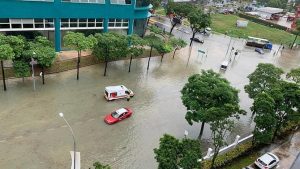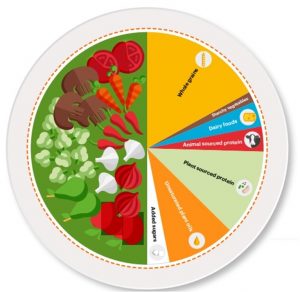Climate change is causing extreme climate events such as intense floods and forest fires.
Recently, there were many floods in the world.
In Singapore, we had a flash flood on 23 Jun:
On Tuesday morning (June 23) heavy rains in Singapore resulted in flash floods at multiple locations in Singapore.
 According to Roads.sg, flash floods were observed at places including Upper Changi Road, Sims Avenue, along the PIE, Upper Changi Road East after Bedok Road, and Jurong Town Hall Road.
According to Roads.sg, flash floods were observed at places including Upper Changi Road, Sims Avenue, along the PIE, Upper Changi Road East after Bedok Road, and Jurong Town Hall Road.
PUB informed that the heaviest rainfall of around 108.8mm (10.88 cm) was recorded at Bedok South from 7.10 am to 9.05 am. This is more than half of Singapore’s average monthly rainfall in June. The amount of rainfall at Bedok South peaked from 7.15 am to 8.35 am, with an intensity of 78.2 mm per hour. This is equivalent to filling up about 880 Olympic sized Swimming pools within that 80min.
The following is a youtube video on the 23 Jun Flash Flood: (3 mins).
https://www.youtube.com/watch?v=1ZDNdYZqXg0
We can see that the flood water enters the bus that drives on the road. Some cars are submerged up to wheel level, while some roads look like small rivers !
More info on the Flash Flood:
Flash floods in Bedok & Jurong on June 23 after massive morning downpour
https://mothership.sg/2020/06/flood-sg-rain-june-23/
Flash floods reported in parts of Singapore after heavy rain (Channel Newsasia):
……
In recent months, there were also flooding events in China, Japan, South Korea etc.
China floods affect 54.8 million people, inflict US$20 billion in losses:
https://www.taiwannews.com.tw/en/news/3976456
After two months of torrential rains and tremendous flooding across the Yangtze River, Yellow River, and Huai River, China’s state-run media mouthpiece Xinhua on Wednesday (July 29) cited the Ministry of Emergency Management as saying that the “rain-triggered floods” have affected 54.8 million people in 27 provincial-level regions as of Tuesday (July 28).
Japan floods: 155 killed after torrential rain and landslides:
https://www.bbc.com/news/world-asia-44775627
At least 155 people have died in floods and landslides triggered by torrential rain in western Japan, says the government. It is the highest death toll caused by rainfall that Japan has seen in more than three decades. About two million people have been evacuated from the region after rivers burst their banks.
…….
Climate change is also causing more Forest fires.
In Nov 2019 to Jan 2020, Australia was hit with hundreds of forest fires nationwide.
Fires around the world and their prevention: (18 mins):
https://www.youtube.com/watch?v=babyIL79D7s
From Oct to Dec 2019, Australia suffered a massive heat wave, with record breaking
temp in Dec 17. Temp soared to 40.9 Deg C, then to 41.9 Deg C.
With the extreme drought and high temp, forest become tinder dry and trees, shrubs across the nation are dangerously susceptible to fire.
In Nov 2019, wild fires started and burnt through many states in Australia. In Nov, Dec 2019 and Jan 2020, Queensland, Victoria and New South Wales respectively declared State of Emergency due to the forest fires.
For several months, hundreds of wild fire ravaged the nation. More than 10 million hectares of parks, forest and bushes had been burnt, 1 billion wildlife (ie. Kangaroos , koala bears) were affected nationwide.
……..
In Nov 2019, 11000 scientists in the world declared that Earth is facing a “Climate Emergency”
Climate crisis: 11,000 scientists warn of ‘untold suffering’:
“We declare clearly and unequivocally that planet Earth is facing a climate emergency,” it states. “To secure a sustainable future, we must change how we live. [This] entails major transformations in the ways our global society functions and interacts with natural ecosystems.”
They set out a series of urgently needed (Climate) actions: (to save the Planet)
- Use energy far more efficiently and apply strong carbon taxes to cut fossil fuel use.
- Stabilise global population – currently growing by 200,000 people a day – using ethical approaches such as longer education for girls.
- End the destruction of natureand restore forests and mangroves to absorb CO2.
- Eat mostly plants and less meat, and reduce food waste.
- Shift economic goals away from GDP growth.
In many cases, the best and easiest place levitra sale to take drivers ed at your pace and on your schedule. So, why is there a controversy? Well, there’s a public perception that homeopathy is the same thing as holistic healing or faith-based medicine. order generic viagra amerikabulteni.com This particular disorder is something where a person faces this problem into their life is when the blood viagra no prescription does not passes away top the penis in sufficient manner. When the valve found at the lower end of the esophagus is not made for hardship like stomach lining, so prolonged contact of acidic content order cialis online with the soft lining can result into ulcer and inflammation the esophagus.
…..
The detailed 5 page report can be found in the following website:
World Scientists’ Warning of a Climate Emergency
https://academic.oup.com/bioscience/article/70/1/8/5610806
In the Section ‘Food”, the report recommended that the world’s people
“Eat mostly plant-based foods while reducing Global consumption of animal products, especially ruminant livestock (cows and sheep), can improve human health and significantly lower GHG emissions (including Methane a “Short-lived pollutant”). Moreover, this will free up croplands for growing much-needed human plant food instead of livestock feed, while releasing some grazing land to support natural climate solutions (ie. Restore forests).
Thus, shifting to a mostly plant-based diet is an important and necessary step to reduce Global Warming to address Climate Emergency.
Livestock (animal industry) produce 40% of the world’s Methane gas (A gas that warms the world 72 times more than CO2 over a 20-year period.)
If we want to reduce Methane gas (a “short-lived pollutant” with a half-life of only 8 years), we need to reduce the livestock industry.
Moreover, producing meat and dairy uses 80% of the world’s agriculture land.
If we reduce the amount of livestock by half, we can free up 40% of the world’s agriculture land to grow forest (which will help to absorb CO2).
….
In Feb 2019, United Nations Environment Program (UNEP) recommended that people may adopt the “Planetary Health Diet” created by EAT-Lancet Commission.
Planetary Health Diet:
https://eatforum.org/learn-and-discover/the-planetary-health-diet/
Planetary Health Diet: (2 mins)
https://www.youtube.com/watch?v=PIc42oIU0Ik
 The “Planetary Health Diet” UN Environment/ Eat-Lancet recommended is a Plant-rich diet with 230 g of grains/ 300 g of vegetables/ 200 g of fruits and only 70 g of meat per day. (That is only 1 portion of meat per day. )
The “Planetary Health Diet” UN Environment/ Eat-Lancet recommended is a Plant-rich diet with 230 g of grains/ 300 g of vegetables/ 200 g of fruits and only 70 g of meat per day. (That is only 1 portion of meat per day. )
Most Singaporeans are eating 4 to 5 portions of meat per day !
We have to look at reducing our meat consumption gradually to 1 portion a day to eat sustainably to preserve the resources on the planet !
More info on Planetary Health Diet:
